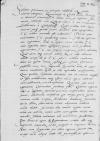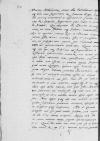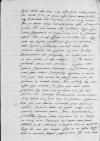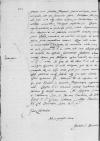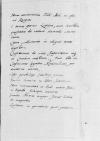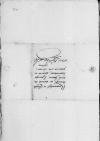In reditu meo ex inferiori Germany (Germania, Niemcy)⌊GermaniaGermany (Germania, Niemcy)⌋ reddidit mihi Lübeck (Lubeca, Lubicensis urbs, Lubecum), city in northern Germany, on the mouth of the Trave river, capital of the Hanseatic League⌊LubecaeLübeck (Lubeca, Lubicensis urbs, Lubecum), city in northern Germany, on the mouth of the Trave river, capital of the Hanseatic League⌋ cf. Ioannes DANTISCUS to Jakob von BARTHEN before 1540-11-20, CIDTC IDL 6539, letter lost⌊litterascf. Ioannes DANTISCUS to Jakob von BARTHEN before 1540-11-20, CIDTC IDL 6539, letter lost⌋ a Tua Celsitudine Eustathius Knobelsdorf (Constans Alliopagus) (*1519 – †1571), neo-Latin poet, studied at the universities in Frankfurt an der Oder (1534-1544), Wittenberg (1538), Leipzig, Louvain (1540), Paris, and Orleans; from 1533 Dantiscus provided financial support for his education; 1544 secretary of the Ermland (Warmia) Chapter; 1546 Canon of Ermland; 1546 Canon of Wrocław (Breslau); 1546-1548 Chancellor of the Ermland Chapter; 1548-1551 administrator of the Chapter's estate in Allenstein (Olsztyn); 1552 Custos of Ermland; 1553 Vicar General of the bishopric of Ermland; 1558-1564 administrator of the diocese of Ermland in the absence of Bishop Stanisław Hozjusz; 1559 Chancellor of the Wrocław Chapter; 1565 Dean of the Wrocław Chapter; 1567 General Judicial Vicar of the diocese of Wrocław (BORAWSKA 1996 Życie, p. 70, 103; KOPICZKO 2, p. 152; SBKW, p. 152; KNOBELSDORF)⌊Eustachius a CnobelssdorffEustathius Knobelsdorf (Constans Alliopagus) (*1519 – †1571), neo-Latin poet, studied at the universities in Frankfurt an der Oder (1534-1544), Wittenberg (1538), Leipzig, Louvain (1540), Paris, and Orleans; from 1533 Dantiscus provided financial support for his education; 1544 secretary of the Ermland (Warmia) Chapter; 1546 Canon of Ermland; 1546 Canon of Wrocław (Breslau); 1546-1548 Chancellor of the Ermland Chapter; 1548-1551 administrator of the Chapter's estate in Allenstein (Olsztyn); 1552 Custos of Ermland; 1553 Vicar General of the bishopric of Ermland; 1558-1564 administrator of the diocese of Ermland in the absence of Bishop Stanisław Hozjusz; 1559 Chancellor of the Wrocław Chapter; 1565 Dean of the Wrocław Chapter; 1567 General Judicial Vicar of the diocese of Wrocław (BORAWSKA 1996 Życie, p. 70, 103; KOPICZKO 2, p. 152; SBKW, p. 152; KNOBELSDORF)⌋. Quae quidem mihi duplici nomine perquam gratae fuere. Primum quod significabant Tuam Celsitudinem adhuc commoda esse valetudine. Deinde quod continebant Tuam Celsitudinem qualecumque meum in scribendo officium non improbare. Unde in posterum minus verebor Tuam Celsitudinem meis impolitis litteris obstrepere, quoties mihi scribendi argumentum Tuae Celsitudinis non prorsus indignum, fuerit oblatum. Quae nova itaque mecum attuli et ex aliis aliunde allata accepi, de iis Tuam Celsitudinem paucis reddam certiorem.
Alter hic agitur mensis, posteaquam ex inferiori Germany (Germania, Niemcy)⌊GermaniaGermany (Germania, Niemcy)⌋ profectus sum, tum Charles V of Habsburg (*1500 – †1558), ruler of the Burgundian territories (1506-1555), King of Spain as Charles I (1516-1556), King of Naples and Sicily, King of the Romans (1519-1530), Holy Roman Emperor of the German Nation (elected 1519, crowned 1530, abdicated 1556); son of Philip I the Handsome and Joanna the Mad of Castile⌊imperatorCharles V of Habsburg (*1500 – †1558), ruler of the Burgundian territories (1506-1555), King of Spain as Charles I (1516-1556), King of Naples and Sicily, King of the Romans (1519-1530), Holy Roman Emperor of the German Nation (elected 1519, crowned 1530, abdicated 1556); son of Philip I the Handsome and Joanna the Mad of Castile⌋ Brussels (Bruxellae), city in the Low Countries, Duchy of Brabant, since the regency of Mary of Hungary the capital of the Habsburg Netherlands, today the capital of Belgium⌊BruxellaeBrussels (Bruxellae), city in the Low Countries, Duchy of Brabant, since the regency of Mary of Hungary the capital of the Habsburg Netherlands, today the capital of Belgium⌋ erat, eo singularum civitatum legati ex illis regionibus confluxerant. Quos quidem Charles V of Habsburg (*1500 – †1558), ruler of the Burgundian territories (1506-1555), King of Spain as Charles I (1516-1556), King of Naples and Sicily, King of the Romans (1519-1530), Holy Roman Emperor of the German Nation (elected 1519, crowned 1530, abdicated 1556); son of Philip I the Handsome and Joanna the Mad of Castile⌊imperatorCharles V of Habsburg (*1500 – †1558), ruler of the Burgundian territories (1506-1555), King of Spain as Charles I (1516-1556), King of Naples and Sicily, King of the Romans (1519-1530), Holy Roman Emperor of the German Nation (elected 1519, crowned 1530, abdicated 1556); son of Philip I the Handsome and Joanna the Mad of Castile⌋ dicebatur eam ob causam vocasse, ut ipsis valediceret eosque officii sui in republica se absente administranda commonefaceret, quoniam ipse brevi superiorem Germany (Germania, Niemcy)⌊GermaniamGermany (Germania, Niemcy)⌋ petiturus esset. Ceterum regiones illae in ingentem pecuniae summam conferendam consenserunt. Holland, county in the Low Countries, today part of the Netherlands⌊HolandiaHolland, county in the Low Countries, today part of the Netherlands⌋ contribuet sex annorum spatio, sexies centena milia aureorum, Brabant (Brabantia), duchy in the Low Countries, under Habsburg rule from 1482. Its territory corresponds to the Belgian provinces of Flemish Brabant, Walloon Brabant, Antwerp and the Brussels Capital Region, and the province of North-Brabant in the Netherlands⌊BrabantiaBrabant (Brabantia), duchy in the Low Countries, under Habsburg rule from 1482. Its territory corresponds to the Belgian provinces of Flemish Brabant, Walloon Brabant, Antwerp and the Brussels Capital Region, and the province of North-Brabant in the Netherlands⌋ duodecies, Flanders (Flandria), county in the Low Countries, part of the Habsburg Netherlands from 1482, today corresponding to the Belgian provinces of Western Flanders and Eastern Flanders, the region of Zeeuws-Vlaanderen in the Netherlands and part of the Département du Nord in France⌊FlandriaFlanders (Flandria), county in the Low Countries, part of the Habsburg Netherlands from 1482, today corresponding to the Belgian provinces of Western Flanders and Eastern Flanders, the region of Zeeuws-Vlaanderen in the Netherlands and part of the Département du Nord in France⌋ decies octies, Hainaut (Hannonia, County of Hainaut), county in the Low Countries, from 1482 under Habsburg rule. Its territory corresponds with the Belgian province of Hainaut, and part of the French Département du Nord⌊HannoniaHainaut (Hannonia, County of Hainaut), county in the Low Countries, from 1482 under Habsburg rule. Its territory corresponds with the Belgian province of Hainaut, and part of the French Département du Nord⌋ etiam aliquoties centena milia dabit. Zeeland (Zealand, Selandia), county in the Low Countries, belonging to the Habsburg Netherlands, with Middleburg as its capital. It covers the islands in the estuary of the Schelde (Scheldt) and Maas (Meuse) rivers, today a province of the Netherlands⌊SelandiaZeeland (Zealand, Selandia), county in the Low Countries, belonging to the Habsburg Netherlands, with Middleburg as its capital. It covers the islands in the estuary of the Schelde (Scheldt) and Maas (Meuse) rivers, today a province of the Netherlands⌋ autem, tametsi impetu maris valde sit attrita, tamen ultra septuaginta milia numerabit. Tributa ordinaria autem nihilominus pendentur. Inter Francis I of Valois (*1494 – †1547), 1515-1547 King of France; son of Charles, Count of Angoulême, and Louise of Savoy⌊Franciae regemFrancis I of Valois (*1494 – †1547), 1515-1547 King of France; son of Charles, Count of Angoulême, and Louise of Savoy⌋ et Charles V of Habsburg (*1500 – †1558), ruler of the Burgundian territories (1506-1555), King of Spain as Charles I (1516-1556), King of Naples and Sicily, King of the Romans (1519-1530), Holy Roman Emperor of the German Nation (elected 1519, crowned 1530, abdicated 1556); son of Philip I the Handsome and Joanna the Mad of Castile⌊imperatoremCharles V of Habsburg (*1500 – †1558), ruler of the Burgundian territories (1506-1555), King of Spain as Charles I (1516-1556), King of Naples and Sicily, King of the Romans (1519-1530), Holy Roman Emperor of the German Nation (elected 1519, crowned 1530, abdicated 1556); son of Philip I the Handsome and Joanna the Mad of Castile⌋ subita illa atque insperata concordia exibit fortasse in magnum bellum. Nam cum Charles V of Habsburg (*1500 – †1558), ruler of the Burgundian territories (1506-1555), King of Spain as Charles I (1516-1556), King of Naples and Sicily, King of the Romans (1519-1530), Holy Roman Emperor of the German Nation (elected 1519, crowned 1530, abdicated 1556); son of Philip I the Handsome and Joanna the Mad of Castile⌊imperatorCharles V of Habsburg (*1500 – †1558), ruler of the Burgundian territories (1506-1555), King of Spain as Charles I (1516-1556), King of Naples and Sicily, King of the Romans (1519-1530), Holy Roman Emperor of the German Nation (elected 1519, crowned 1530, abdicated 1556); son of Philip I the Handsome and Joanna the Mad of Castile⌋ per illius regnum faceret iter, accepi eum aliquo modo illi promisisse se cessurum
 UUB, H. 154, f. 33v
Milan (Mediolanum, Milano), duchy in northern Italy⌊ducatu MediolanensiMilan (Mediolanum, Milano), duchy in northern Italy⌋, causa illa hereditaria dissidii atque belli inter imperatores et France (Gallia, Francia), the kingdom⌊FranciaeFrance (Gallia, Francia), the kingdom⌋ reges. Postea autem summa contentione id dissuaserunt Italy (Italia)⌊ItaliaeItaly (Italia)⌋ principes et praesides imperatoris, quos habet in Sicily, island in the Mediterranean Sea, Kingdom ruled by the Habsburgs⌊SiciliaSicily, island in the Mediterranean Sea, Kingdom ruled by the Habsburgs⌋ et Naples (Napoli, Neapolis), city in Italy, on the coast of the Tyrrhenian Sea, capital of the region of Campania⌊NeapoliNaples (Napoli, Neapolis), city in Italy, on the coast of the Tyrrhenian Sea, capital of the region of Campania⌋, quandoquidem Milan (Mediolanum, Milano), duchy in northern Italy⌊ille ducatusMilan (Mediolanum, Milano), duchy in northern Italy⌋ sit tamquam clavis, ad totam Italy (Italia)⌊ItaliamItaly (Italia)⌋ atque Sicily, island in the Mediterranean Sea, Kingdom ruled by the Habsburgs⌊SiciliamSicily, island in the Mediterranean Sea, Kingdom ruled by the Habsburgs⌋ invadendam. Et ut maxime praesens probably Francis I of Valois (*1494 – †1547), 1515-1547 King of France; son of Charles, Count of Angoulême, and Louise of Savoy⌊rexprobably Francis I of Valois (*1494 – †1547), 1515-1547 King of France; son of Charles, Count of Angoulême, and Louise of Savoy⌋ Milan (Mediolanum, Milano), duchy in northern Italy⌊eo ducatuMilan (Mediolanum, Milano), duchy in northern Italy⌋ contentus futurus esset, tamen verendum esse, ne successores eius ad propagandum regnum per huiusmodi occasionem loci opportunitatem invitentur. Quare etiam neque probably Francis I of Valois (*1494 – †1547), 1515-1547 King of France; son of Charles, Count of Angoulême, and Louise of Savoy⌊rexprobably Francis I of Valois (*1494 – †1547), 1515-1547 King of France; son of Charles, Count of Angoulême, and Louise of Savoy⌋ ipse neque delphinus ad Charles V of Habsburg (*1500 – †1558), ruler of the Burgundian territories (1506-1555), King of Spain as Charles I (1516-1556), King of Naples and Sicily, King of the Romans (1519-1530), Holy Roman Emperor of the German Nation (elected 1519, crowned 1530, abdicated 1556); son of Philip I the Handsome and Joanna the Mad of Castile⌊imperatoremCharles V of Habsburg (*1500 – †1558), ruler of the Burgundian territories (1506-1555), King of Spain as Charles I (1516-1556), King of Naples and Sicily, King of the Romans (1519-1530), Holy Roman Emperor of the German Nation (elected 1519, crowned 1530, abdicated 1556); son of Philip I the Handsome and Joanna the Mad of Castile⌋ in inferiorem Germany (Germania, Niemcy)⌊GermaniamGermany (Germania, Niemcy)⌋ venerunt, cum tamen principio illorum adventus certo expectaretur.
UUB, H. 154, f. 33v
Milan (Mediolanum, Milano), duchy in northern Italy⌊ducatu MediolanensiMilan (Mediolanum, Milano), duchy in northern Italy⌋, causa illa hereditaria dissidii atque belli inter imperatores et France (Gallia, Francia), the kingdom⌊FranciaeFrance (Gallia, Francia), the kingdom⌋ reges. Postea autem summa contentione id dissuaserunt Italy (Italia)⌊ItaliaeItaly (Italia)⌋ principes et praesides imperatoris, quos habet in Sicily, island in the Mediterranean Sea, Kingdom ruled by the Habsburgs⌊SiciliaSicily, island in the Mediterranean Sea, Kingdom ruled by the Habsburgs⌋ et Naples (Napoli, Neapolis), city in Italy, on the coast of the Tyrrhenian Sea, capital of the region of Campania⌊NeapoliNaples (Napoli, Neapolis), city in Italy, on the coast of the Tyrrhenian Sea, capital of the region of Campania⌋, quandoquidem Milan (Mediolanum, Milano), duchy in northern Italy⌊ille ducatusMilan (Mediolanum, Milano), duchy in northern Italy⌋ sit tamquam clavis, ad totam Italy (Italia)⌊ItaliamItaly (Italia)⌋ atque Sicily, island in the Mediterranean Sea, Kingdom ruled by the Habsburgs⌊SiciliamSicily, island in the Mediterranean Sea, Kingdom ruled by the Habsburgs⌋ invadendam. Et ut maxime praesens probably Francis I of Valois (*1494 – †1547), 1515-1547 King of France; son of Charles, Count of Angoulême, and Louise of Savoy⌊rexprobably Francis I of Valois (*1494 – †1547), 1515-1547 King of France; son of Charles, Count of Angoulême, and Louise of Savoy⌋ Milan (Mediolanum, Milano), duchy in northern Italy⌊eo ducatuMilan (Mediolanum, Milano), duchy in northern Italy⌋ contentus futurus esset, tamen verendum esse, ne successores eius ad propagandum regnum per huiusmodi occasionem loci opportunitatem invitentur. Quare etiam neque probably Francis I of Valois (*1494 – †1547), 1515-1547 King of France; son of Charles, Count of Angoulême, and Louise of Savoy⌊rexprobably Francis I of Valois (*1494 – †1547), 1515-1547 King of France; son of Charles, Count of Angoulême, and Louise of Savoy⌋ ipse neque delphinus ad Charles V of Habsburg (*1500 – †1558), ruler of the Burgundian territories (1506-1555), King of Spain as Charles I (1516-1556), King of Naples and Sicily, King of the Romans (1519-1530), Holy Roman Emperor of the German Nation (elected 1519, crowned 1530, abdicated 1556); son of Philip I the Handsome and Joanna the Mad of Castile⌊imperatoremCharles V of Habsburg (*1500 – †1558), ruler of the Burgundian territories (1506-1555), King of Spain as Charles I (1516-1556), King of Naples and Sicily, King of the Romans (1519-1530), Holy Roman Emperor of the German Nation (elected 1519, crowned 1530, abdicated 1556); son of Philip I the Handsome and Joanna the Mad of Castile⌋ in inferiorem Germany (Germania, Niemcy)⌊GermaniamGermany (Germania, Niemcy)⌋ venerunt, cum tamen principio illorum adventus certo expectaretur.
Praeterea in reditu meo offendi in quodam oppido Westfalen (Westphalia), duchy in the Holy Roman Empire⌊VuestualiaeWestfalen (Westphalia), duchy in the Holy Roman Empire⌋, quod vocant Loningem, legatum Francis I of Valois (*1494 – †1547), 1515-1547 King of France; son of Charles, Count of Angoulême, and Louise of Savoy⌊regis FranciaeFrancis I of Valois (*1494 – †1547), 1515-1547 King of France; son of Charles, Count of Angoulême, and Louise of Savoy⌋ ac iuxta aliquot tribunos exercitus Citizens of Bremen ⌊BremensiumCitizens of Bremen ⌋. Ex iis unus se adiunxit comitatui nostro ac aliquot miliarium nobiscum iter fecit. Unus autem ex nobis se insinuavit in eius notitiam comperitque ab eo. Legatum illum regis dictos tribunos, inter quos esset Mainardus vom Hamme ⌊Mainardus vom HammeMainardus vom Hamme ⌋, Francis I of Valois (*1494 – †1547), 1515-1547 King of France; son of Charles, Count of Angoulême, and Louise of Savoy⌊regiFrancis I of Valois (*1494 – †1547), 1515-1547 King of France; son of Charles, Count of Angoulême, and Louise of Savoy⌋ conduxisse atque adeo cum eis convenisse, ut circa Natalem Domini apud regem adessent. Nam Francis I of Valois (*1494 – †1547), 1515-1547 King of France; son of Charles, Count of Angoulême, and Louise of Savoy⌊regemFrancis I of Valois (*1494 – †1547), 1515-1547 King of France; son of Charles, Count of Angoulême, and Louise of Savoy⌋ quoque aliis suis militibus ac tribunis, quibus stipendium quotannis numerat, edixisse, ut eo tempore quoque compareant.
De domino Cornelis De Schepper (Cornelius Scepperus, Cornelis De Dobbele, Cornelius Duplicius) (*1503 – †1555), erudite, diplomat in the Habsburgs' service; close friend of Ioannes Dantiscus; initially in the service of Christian II of Oldenburg, King of Denmark; 1526 secretary and councillor to Emperor Charles V of Habsburg (CE, vol. 3, p. 218-220; DE VOCHT 1961, p. 15-24)⌊Cornelio ScheperoCornelis De Schepper (Cornelius Scepperus, Cornelis De Dobbele, Cornelius Duplicius) (*1503 – †1555), erudite, diplomat in the Habsburgs' service; close friend of Ioannes Dantiscus; initially in the service of Christian II of Oldenburg, King of Denmark; 1526 secretary and councillor to Emperor Charles V of Habsburg (CE, vol. 3, p. 218-220; DE VOCHT 1961, p. 15-24)⌋ non est, quod multa scribam, cum nuper ab illo Tua Celsitudo litteras acceperit. Adfuit mihi autem in causa amicorum meorum, propter commendationem Tuae Celsitudinis. Quare et amici mei, inter quos est dominus Tiedemann Giese (*1491 – †1556), 1525, 1526, 1531 alderman in Gdańsk; 1533 - consenior; 1536 - senior; 1539 - councillor; 1540-1556 mayor; 1547, 1555 - burgrave; nephew of the Ermland bishop Tiedemann Giese (ZDRENKA 2, p. 114)⌊Tidemannus GiseTiedemann Giese (*1491 – †1556), 1525, 1526, 1531 alderman in Gdańsk; 1533 - consenior; 1536 - senior; 1539 - councillor; 1540-1556 mayor; 1547, 1555 - burgrave; nephew of the Ermland bishop Tiedemann Giese (ZDRENKA 2, p. 114)⌋ consul, et ego Tuae Celsitudini ingentes agimus gratias.
 UUB, H. 154, f. 34r
Apud multos alios bonos viros mihi etiam valde profuit sola mentio Tuae Celsitudinis, ut quam affirmarent tanta prudentia atque humanitate illic versatam esse, ut numquam memoria istius ex bonorum virorum animis elapsura esset. Praecipuam operam autem mihi navavit dominus Galenius Zeger ⌊Galenius ZegerGalenius Zeger ⌋, consiliarius Charles V of Habsburg (*1500 – †1558), ruler of the Burgundian territories (1506-1555), King of Spain as Charles I (1516-1556), King of Naples and Sicily, King of the Romans (1519-1530), Holy Roman Emperor of the German Nation (elected 1519, crowned 1530, abdicated 1556); son of Philip I the Handsome and Joanna the Mad of Castile⌊imperatorisCharles V of Habsburg (*1500 – †1558), ruler of the Burgundian territories (1506-1555), King of Spain as Charles I (1516-1556), King of Naples and Sicily, King of the Romans (1519-1530), Holy Roman Emperor of the German Nation (elected 1519, crowned 1530, abdicated 1556); son of Philip I the Handsome and Joanna the Mad of Castile⌋ in Haga comitis, is Tuam Celsitudinem plurimum salvere iubet se ad offerens ad mandata tua.
UUB, H. 154, f. 34r
Apud multos alios bonos viros mihi etiam valde profuit sola mentio Tuae Celsitudinis, ut quam affirmarent tanta prudentia atque humanitate illic versatam esse, ut numquam memoria istius ex bonorum virorum animis elapsura esset. Praecipuam operam autem mihi navavit dominus Galenius Zeger ⌊Galenius ZegerGalenius Zeger ⌋, consiliarius Charles V of Habsburg (*1500 – †1558), ruler of the Burgundian territories (1506-1555), King of Spain as Charles I (1516-1556), King of Naples and Sicily, King of the Romans (1519-1530), Holy Roman Emperor of the German Nation (elected 1519, crowned 1530, abdicated 1556); son of Philip I the Handsome and Joanna the Mad of Castile⌊imperatorisCharles V of Habsburg (*1500 – †1558), ruler of the Burgundian territories (1506-1555), King of Spain as Charles I (1516-1556), King of Naples and Sicily, King of the Romans (1519-1530), Holy Roman Emperor of the German Nation (elected 1519, crowned 1530, abdicated 1556); son of Philip I the Handsome and Joanna the Mad of Castile⌋ in Haga comitis, is Tuam Celsitudinem plurimum salvere iubet se ad offerens ad mandata tua.
Quomodo Henry VIII Tudor (*1491 – †1547), 1509-1547 King of England; son of Henry VII Tudor and Elizabeth of York⌊rex AngliaeHenry VIII Tudor (*1491 – †1547), 1509-1547 King of England; son of Henry VII Tudor and Elizabeth of York⌋ Anne of Cleves (*1515 – †1557), Queen of England (1540-01-06 - 1540-07-09) as the fourth wife of Henry VIII Tudor; daughter of John III the Peaceful, Duke of Cleves, and Maria of Jülich-Berg⌊sorore Wilhelm V Der Reiche (Wilhelm of Jülich-Cleves-Berg, William I of Cleves, William V of Jülich-Berg) (*1516 – †1592), 1538-1543 Duke of Guelders and Zutphen, 1539-1592 Duke of Jülich-Cleves-Berg. During the 3rd Guelderian War that followed, France he was an ally to Guelders against Charles V. His predecessor, Duke Charles of Guelders, also concluded an alliance with France (MÜLLER)⌊principis ClevensisWilhelm V Der Reiche (Wilhelm of Jülich-Cleves-Berg, William I of Cleves, William V of Jülich-Berg) (*1516 – †1592), 1538-1543 Duke of Guelders and Zutphen, 1539-1592 Duke of Jülich-Cleves-Berg. During the 3rd Guelderian War that followed, France he was an ally to Guelders against Charles V. His predecessor, Duke Charles of Guelders, also concluded an alliance with France (MÜLLER)⌋Anne of Cleves (*1515 – †1557), Queen of England (1540-01-06 - 1540-07-09) as the fourth wife of Henry VIII Tudor; daughter of John III the Peaceful, Duke of Cleves, and Maria of Jülich-Berg⌋ repudiata aliam duxerit Catherine Howard (*ca. 1524 – †1542)⌊uxoremCatherine Howard (*ca. 1524 – †1542)⌋, item quomodo caedem aedat primatum England⌊AngliaeEngland⌋, item quomodo Martin Luther (Martinus Lutherus) (*1483 – †1546), theologian, leader and originator of the German Reformation⌊LutherumMartin Luther (Martinus Lutherus) (*1483 – †1546), theologian, leader and originator of the German Reformation⌋ et Philipp Melanchthon (Philipp Schwartzerd) (*1497 – †1560), Lutheran theologian, humanist, Martin Luther's collaborator and friend, author of the Augsburg Confession. He was strongly influenced by Luther, whom he called his spiritual father. In 1519 he was present as a spectator at the disputation of Leipzig between Martin Luther and Johann Eck. He was also in attendance at the Diet of Augsburg (1530) and at the religious colloquy of Worms (1557)⌊Philippum MelanchthonemPhilipp Melanchthon (Philipp Schwartzerd) (*1497 – †1560), Lutheran theologian, humanist, Martin Luther's collaborator and friend, author of the Augsburg Confession. He was strongly influenced by Luther, whom he called his spiritual father. In 1519 he was present as a spectator at the disputation of Leipzig between Martin Luther and Johann Eck. He was also in attendance at the Diet of Augsburg (1530) and at the religious colloquy of Worms (1557)⌋ odio persequatur, non dubito quin Tua Celsitudo ea iam pridem ex aliis acceperit. De Duchy of Guelders (Geldria), duchy in the Low Countries, incorporated in the Habsburg Netherlands in 1543, today part of the Netherlands⌊ducatu GelriensiDuchy of Guelders (Geldria), duchy in the Low Countries, incorporated in the Habsburg Netherlands in 1543, today part of the Netherlands⌋ altum erat silentium. Lübeck (Lubeca, Lubicensis urbs, Lubecum), city in northern Germany, on the mouth of the Trave river, capital of the Hanseatic League⌊LubecaeLübeck (Lubeca, Lubicensis urbs, Lubecum), city in northern Germany, on the mouth of the Trave river, capital of the Hanseatic League⌋ repperi Johan Weze (*1490 – †1548), secretary to King Christian II of Denmark; in 1522 nominated Archbishop of Lund; in 1527 was banished from Denmark as Christian II's secretary, and joined the service of Emperor Charles V as his diplomat, 1537-1548 Bishop of Constance (WHALEY, p. 314)⌊legatum Charles V of Habsburg (*1500 – †1558), ruler of the Burgundian territories (1506-1555), King of Spain as Charles I (1516-1556), King of Naples and Sicily, King of the Romans (1519-1530), Holy Roman Emperor of the German Nation (elected 1519, crowned 1530, abdicated 1556); son of Philip I the Handsome and Joanna the Mad of Castile⌊imperatorisCharles V of Habsburg (*1500 – †1558), ruler of the Burgundian territories (1506-1555), King of Spain as Charles I (1516-1556), King of Naples and Sicily, King of the Romans (1519-1530), Holy Roman Emperor of the German Nation (elected 1519, crowned 1530, abdicated 1556); son of Philip I the Handsome and Joanna the Mad of Castile⌋Johan Weze (*1490 – †1548), secretary to King Christian II of Denmark; in 1522 nominated Archbishop of Lund; in 1527 was banished from Denmark as Christian II's secretary, and joined the service of Emperor Charles V as his diplomat, 1537-1548 Bishop of Constance (WHALEY, p. 314)⌋, episcopum Constantiensem, qui simul gerit titulum archiepiscopi Londensis. Is, tametsi tum supra duos menses ibi egerat, tamen clam fuit quidnam in mandatis habeat. Nam posteaquam illuc advenisset, mox correptus fuit febri, quae modo passim grassatur, eaque etiam tum vexabatur, cum ego illac facerem iter. Principio autem solummodo mutuae salutationes habitae sunt inter eum et senatum Lubecensem.
Haec fere sunt, domine clementissime, quae mecum ex inferiori Germany (Germania, Niemcy)⌊GermaniaGermany (Germania, Niemcy)⌋ attuli, hic postea accepi, quid in superiori Germany (Germania, Niemcy)⌊GermaniaGermany (Germania, Niemcy)⌋ agatur. Inter Charles V of Habsburg (*1500 – †1558), ruler of the Burgundian territories (1506-1555), King of Spain as Charles I (1516-1556), King of Naples and Sicily, King of the Romans (1519-1530), Holy Roman Emperor of the German Nation (elected 1519, crowned 1530, abdicated 1556); son of Philip I the Handsome and Joanna the Mad of Castile⌊imperatoremCharles V of Habsburg (*1500 – †1558), ruler of the Burgundian territories (1506-1555), King of Spain as Charles I (1516-1556), King of Naples and Sicily, King of the Romans (1519-1530), Holy Roman Emperor of the German Nation (elected 1519, crowned 1530, abdicated 1556); son of Philip I the Handsome and Joanna the Mad of Castile⌋ et protestantes imperii status conventum est, ut theologi ex utraque parte Worms (Vormatia), city in western Germany, on the Rhine river⌊VuormaciaeWorms (Vormatia), city in western Germany, on the Rhine river⌋ confluerent circa finem Octobris, ac de controversiis ecclesiasticis inter se conferrent. Quae autem inter ipsos concessa essent, ut ea postea Regensburg (Ratisbona), city in southeastern Germany, Bavaria, on the Danube river⌊RatisbonaeRegensburg (Ratisbona), city in southeastern Germany, Bavaria, on the Danube river⌋ in conventu imperii proponerentur. Ibi tum
 UUB, H. 154, f. 34v
Charles V of Habsburg (*1500 – †1558), ruler of the Burgundian territories (1506-1555), King of Spain as Charles I (1516-1556), King of Naples and Sicily, King of the Romans (1519-1530), Holy Roman Emperor of the German Nation (elected 1519, crowned 1530, abdicated 1556); son of Philip I the Handsome and Joanna the Mad of Castile⌊imperatoremCharles V of Habsburg (*1500 – †1558), ruler of the Burgundian territories (1506-1555), King of Spain as Charles I (1516-1556), King of Naples and Sicily, King of the Romans (1519-1530), Holy Roman Emperor of the German Nation (elected 1519, crowned 1530, abdicated 1556); son of Philip I the Handsome and Joanna the Mad of Castile⌋ cum statibus imperii pronuntiaturum, quae servanda aut non servanda essent. Philipp Melanchthon (Philipp Schwartzerd) (*1497 – †1560), Lutheran theologian, humanist, Martin Luther's collaborator and friend, author of the Augsburg Confession. He was strongly influenced by Luther, whom he called his spiritual father. In 1519 he was present as a spectator at the disputation of Leipzig between Martin Luther and Johann Eck. He was also in attendance at the Diet of Augsburg (1530) and at the religious colloquy of Worms (1557)⌊Philippus Melanch(thon)Philipp Melanchthon (Philipp Schwartzerd) (*1497 – †1560), Lutheran theologian, humanist, Martin Luther's collaborator and friend, author of the Augsburg Confession. He was strongly influenced by Luther, whom he called his spiritual father. In 1519 he was present as a spectator at the disputation of Leipzig between Martin Luther and Johann Eck. He was also in attendance at the Diet of Augsburg (1530) and at the religious colloquy of Worms (1557)⌋ autem cum uno atque altero collega ex Wittenberg (Vittemberga), city in east-central Germany, Saxony, on the Elbe river, 70 km NE of Leipzig⌊VuittenbergaWittenberg (Vittemberga), city in east-central Germany, Saxony, on the Elbe river, 70 km NE of Leipzig⌋ ad dictum conventum theologorum profectus est. Jesus of Nazareth (Jesus Christ), in Christianity the Messiah foretold in the Old Testament⌊ChristusJesus of Nazareth (Jesus Christ), in Christianity the Messiah foretold in the Old Testament⌋, caput Ecclessiae ac princeps pacis, adsit disputationi huic theologicae, ut privatis commodis remotis tantum gloria Jesus of Nazareth (Jesus Christ), in Christianity the Messiah foretold in the Old Testament⌊Christi ServatorisJesus of Nazareth (Jesus Christ), in Christianity the Messiah foretold in the Old Testament⌋ ac saulute animarum ob oculos posita piam concordiam ineant. Quae autem antea in conventibus theologorum de concordia acta sunt, ea typis excusa sunt superinscribed⌈suntsunt superinscribed⌉ ad Tuam Celsitudinem mitto una cum aliquot epistulis de concilio et discidio Germany (Germania, Niemcy)⌊GermaniaeGermany (Germania, Niemcy)⌋. Indicem aliorum novorum librorum, quos bibliopola noster praecipuos on the margin⌈praecipuospraecipuos on the margin⌉ attulit, his inclusum, ad Tuam Celsitudinem mitto. Si quos de his libris Tua Celsitudo sibi mitti voluerit, dignetur id mihi delegare, qui et in his curandis et in aliis rebus, quae per meam tenuitatem effici poterunt, numquam fidelis atque prompti clientis officio defuturus est. Adiunxi etiam his libellum de iis, quae Traiecti in honorem imperatoris apparata vidi.
UUB, H. 154, f. 34v
Charles V of Habsburg (*1500 – †1558), ruler of the Burgundian territories (1506-1555), King of Spain as Charles I (1516-1556), King of Naples and Sicily, King of the Romans (1519-1530), Holy Roman Emperor of the German Nation (elected 1519, crowned 1530, abdicated 1556); son of Philip I the Handsome and Joanna the Mad of Castile⌊imperatoremCharles V of Habsburg (*1500 – †1558), ruler of the Burgundian territories (1506-1555), King of Spain as Charles I (1516-1556), King of Naples and Sicily, King of the Romans (1519-1530), Holy Roman Emperor of the German Nation (elected 1519, crowned 1530, abdicated 1556); son of Philip I the Handsome and Joanna the Mad of Castile⌋ cum statibus imperii pronuntiaturum, quae servanda aut non servanda essent. Philipp Melanchthon (Philipp Schwartzerd) (*1497 – †1560), Lutheran theologian, humanist, Martin Luther's collaborator and friend, author of the Augsburg Confession. He was strongly influenced by Luther, whom he called his spiritual father. In 1519 he was present as a spectator at the disputation of Leipzig between Martin Luther and Johann Eck. He was also in attendance at the Diet of Augsburg (1530) and at the religious colloquy of Worms (1557)⌊Philippus Melanch(thon)Philipp Melanchthon (Philipp Schwartzerd) (*1497 – †1560), Lutheran theologian, humanist, Martin Luther's collaborator and friend, author of the Augsburg Confession. He was strongly influenced by Luther, whom he called his spiritual father. In 1519 he was present as a spectator at the disputation of Leipzig between Martin Luther and Johann Eck. He was also in attendance at the Diet of Augsburg (1530) and at the religious colloquy of Worms (1557)⌋ autem cum uno atque altero collega ex Wittenberg (Vittemberga), city in east-central Germany, Saxony, on the Elbe river, 70 km NE of Leipzig⌊VuittenbergaWittenberg (Vittemberga), city in east-central Germany, Saxony, on the Elbe river, 70 km NE of Leipzig⌋ ad dictum conventum theologorum profectus est. Jesus of Nazareth (Jesus Christ), in Christianity the Messiah foretold in the Old Testament⌊ChristusJesus of Nazareth (Jesus Christ), in Christianity the Messiah foretold in the Old Testament⌋, caput Ecclessiae ac princeps pacis, adsit disputationi huic theologicae, ut privatis commodis remotis tantum gloria Jesus of Nazareth (Jesus Christ), in Christianity the Messiah foretold in the Old Testament⌊Christi ServatorisJesus of Nazareth (Jesus Christ), in Christianity the Messiah foretold in the Old Testament⌋ ac saulute animarum ob oculos posita piam concordiam ineant. Quae autem antea in conventibus theologorum de concordia acta sunt, ea typis excusa sunt superinscribed⌈suntsunt superinscribed⌉ ad Tuam Celsitudinem mitto una cum aliquot epistulis de concilio et discidio Germany (Germania, Niemcy)⌊GermaniaeGermany (Germania, Niemcy)⌋. Indicem aliorum novorum librorum, quos bibliopola noster praecipuos on the margin⌈praecipuospraecipuos on the margin⌉ attulit, his inclusum, ad Tuam Celsitudinem mitto. Si quos de his libris Tua Celsitudo sibi mitti voluerit, dignetur id mihi delegare, qui et in his curandis et in aliis rebus, quae per meam tenuitatem effici poterunt, numquam fidelis atque prompti clientis officio defuturus est. Adiunxi etiam his libellum de iis, quae Traiecti in honorem imperatoris apparata vidi.
Jesus of Nazareth (Jesus Christ), in Christianity the Messiah foretold in the Old Testament⌊ChristusJesus of Nazareth (Jesus Christ), in Christianity the Messiah foretold in the Old Testament⌋ Tuam Celsitudinem communi patriae incolumem et felicem quam diutissime conservet. Dominus Georg Schewecke (Georg Scheffke) (*1491 – †1547), 1522 Gdańsk alderman; 1525 - town councillor; 1528 - judge; 1531 - mayor; 1536-1537, 1540, 1542-1545 - burgrave; 1534 Gdańsk envoy to convention in Lüneburg in affairs of seafaring and conflicts with Lübeck (AT 15, p. 501, 510; AT 16/1, p. 42, 44; ZDRENKA 2, p. 275)⌊Georgius ScheuekeGeorg Schewecke (Georg Scheffke) (*1491 – †1547), 1522 Gdańsk alderman; 1525 - town councillor; 1528 - judge; 1531 - mayor; 1536-1537, 1540, 1542-1545 - burgrave; 1534 Gdańsk envoy to convention in Lüneburg in affairs of seafaring and conflicts with Lübeck (AT 15, p. 501, 510; AT 16/1, p. 42, 44; ZDRENKA 2, p. 275)⌋, dominus Tiedemann Giese (*1491 – †1556), 1525, 1526, 1531 alderman in Gdańsk; 1533 - consenior; 1536 - senior; 1539 - councillor; 1540-1556 mayor; 1547, 1555 - burgrave; nephew of the Ermland bishop Tiedemann Giese (ZDRENKA 2, p. 114)⌊Tidemannus GisoTiedemann Giese (*1491 – †1556), 1525, 1526, 1531 alderman in Gdańsk; 1533 - consenior; 1536 - senior; 1539 - councillor; 1540-1556 mayor; 1547, 1555 - burgrave; nephew of the Ermland bishop Tiedemann Giese (ZDRENKA 2, p. 114)⌋, dominus Ioannes Tresler (Dreszler) (†after 1548), born in Gdańsk, from 1509 studied at Leipzig and Bologna; promoted to doctor of medicine and canon law. In 1538 he made ineffective efforts to obtain a canonry of Ermland, then moved to Wrocław; maintained close contact with Nicolaus Copernicus; from 1519 Canon of the Collegiate Chapter in Wrocław (Breslau), and from 1523 its Custos; 1530-1538 town physician and syndic in Gdańsk (Danzig) (SCHWARZ 1939, p. 29; DREWNOWSKI 1978, p. 49, 104, 138, 211; BORAWSKA 2013, p. 319-320)⌊Ioannes TreslerusIoannes Tresler (Dreszler) (†after 1548), born in Gdańsk, from 1509 studied at Leipzig and Bologna; promoted to doctor of medicine and canon law. In 1538 he made ineffective efforts to obtain a canonry of Ermland, then moved to Wrocław; maintained close contact with Nicolaus Copernicus; from 1519 Canon of the Collegiate Chapter in Wrocław (Breslau), and from 1523 its Custos; 1530-1538 town physician and syndic in Gdańsk (Danzig) (SCHWARZ 1939, p. 29; DREWNOWSKI 1978, p. 49, 104, 138, 211; BORAWSKA 2013, p. 319-320)⌋, Urbanus Ulrici (Urbanus Ulrich) (†1543/1544), 1499-1503 studied in Rostock, promoted magister artium; Before 1530 - temporary administrator (commendarius) of the parish of the Blessed Virgin Mary's Church in Gdańsk (Ger. Danzig); 1526 - Gdańsk judicial vicar of Włocławek bishop and parish priest of St Barbara's Church in Gdańsk; 1536 - parish priest of the Church of Blessed Virgin Mary in Gdańsk. (AT, XII, 132, 149; XIV, 803; XV, 4-5, 34, 217; XVIII, 218, 408; RAG, Repertorium Academicum Germanicum. URL: http://www.rag-online.org/gelehrter/id/-1841810725)⌊m(agister) Urbanus hidden by binding⌈[s]s hidden by binding⌉ UlrichUrbanus Ulrici (Urbanus Ulrich) (†1543/1544), 1499-1503 studied in Rostock, promoted magister artium; Before 1530 - temporary administrator (commendarius) of the parish of the Blessed Virgin Mary's Church in Gdańsk (Ger. Danzig); 1526 - Gdańsk judicial vicar of Włocławek bishop and parish priest of St Barbara's Church in Gdańsk; 1536 - parish priest of the Church of Blessed Virgin Mary in Gdańsk. (AT, XII, 132, 149; XIV, 803; XV, 4-5, 34, 217; XVIII, 218, 408; RAG, Repertorium Academicum Germanicum. URL: http://www.rag-online.org/gelehrter/id/-1841810725)⌋ Tuam Celsitudinem officiose salutant.
 UUB, H. 154, f. 33v
UUB, H. 154, f. 33v
 UUB, H. 154, f. 34r
Apud multos alios bonos viros mihi etiam valde profuit sola mentio Tuae Celsitudinis, ut quam affirmarent tanta prudentia atque humanitate illic versatam esse, ut numquam memoria istius ex bonorum virorum animis elapsura esset. Praecipuam operam autem mihi navavit dominus
UUB, H. 154, f. 34r
Apud multos alios bonos viros mihi etiam valde profuit sola mentio Tuae Celsitudinis, ut quam affirmarent tanta prudentia atque humanitate illic versatam esse, ut numquam memoria istius ex bonorum virorum animis elapsura esset. Praecipuam operam autem mihi navavit dominus  UUB, H. 154, f. 34v
UUB, H. 154, f. 34v
